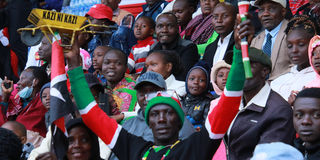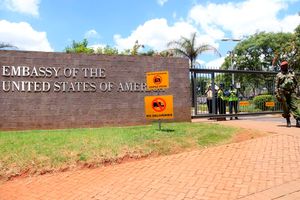
Kenyans gather at Embu Stadium for Madaraka Day celebrations on June 1, 2023.
I’ve often said Kenya isn’t a nation yet, but a nation in embryo. In the nomenclature of identity, a nation traditionally refers to a people with a shared genesis, usually of language, ethnicity, race and other less salient genetic markers.
Though normally a social construction, a nation assumes reality when it becomes a political reality, and is essentialised. In the age of modernity, a nation refers to a collection of nations and sub-nations in a country governed by a state and government.
All nations are today multi-ethnic and multiracial. The constitution then defines all that which the state is, and isn’t. Above all, each nation is identifiable by a zeitgeist, a common consciousness. Let’s interrogate Kenya using this yardstick.
It bears repeating that the country and state we call Kenya today wasn’t the brilliant idea of the indigenes of this good land. We were born of the Age of Empire, specifically the scramble for Africa and the infamous Berlin Conference in which Africa was divvied up among White European colonial powers.
In other words, we don’t own the naming rights to “Kenya” even though it’s derived from the Kikamba word “kinyaa,” which means “with ice, whiteness, or snow on top.” So, we are a creation of Europe as a state. Which begs the question, do we now own this Eurocentric state, or not? Do its owners reside somewhere outside its geographic borders? Have we – can we – domesticated Kenya?
Nation building
I often feel like a stranger in Kenya. As though I am wearing an ill-fitting shoe. A shoe that seems to pinch in so many places. I am often not at ease with Kenya. I have this weird feeling that I am either an “outsider-insider” or an “insider-outsider.” I don’t have a good handle on who is a Kenyan. Sadly, I don’t think most Kenyans do either. Okay – we call ourselves Kenyans, and carry IDs and passports loudly announcing that identity. But in my life, I have met very few Kenyans.
The millions and multitudes I meet are simply “paper” citizens. They have no belief in, or commitment to, Kenya. Most of them might as well be Martians for all I know.
Let me shake your noggin. Our project of nation building has stalled, or it’s even in reverse. Our minds are decaying as is our environment. Listen to the public discourse and critically examine the conduct of elites. It’s vituperative, criminal, toxic and unethical.
It often reminds me of the famous poem by Irish poet W. B. Yates “The Second Coming” from which the line, “Things Fall Apart” is taken. Nations don’t just happen. They are built by men and women of purpose and conviction. People with insight and learning. By an elite that believes in itself and understands how geopolitics work. No outsiders can descend from another culture to build your nation. And if they do, they will own you.
In my view, to build a nation – a great one – you must have several antecedents. The first is an elite that has a sense of ethics and shame. This is especially true of the governing elites. An elite that isn’t self-aware and doesn’t understand the concept of public trusteeship is an elite unto death and darkness.
National zeitgeist
A conscientious elite must develop a national zeitgeist, a governing philosophy of the state, one which pivots on a nobility larger than the self. That governing philosophy must identify a large consensus of what the national interests must be, and then pursue them with a laser focus and singular purpose. Above all, this is a matter of ethics, not law. A great elite must be ethical.
Second, a great elite must have the sense of shame. An elite that’s demonically gluttonous and exhibitionist and which flaunts the wealth it has stolen from public coffers is rotten and can’t lead any successful national building project. You can’t have a corrupt, thieving elite that vomits on those it rules over take a country anywhere.
Ultimately, such elites create an inferno that eventually will consume even them in a ball of fire. A time comes when the long suffering hoi polloi can’t take it anymore and bursts through the barricades of power. I ask Kenya’s elite to take a deep breath, reflect on its waywardness, and make fundamental corrections before everything falls apart. I can see horrific times ahead unless we have an epiphany.
Finally, the elites can’t be perpetually at each other’s throats from election to election. The constitution gives all of us rights, but what good is it if we collapse the country in the name of pursuing power, often without a purpose? We must have a country first in which we can exercise our democratic rights. I see elites running themselves rugged seeking to topple each other. But these guys have been in power before and did nothing except loot. They aren’t Kenya’s saviours.
Makau Mutua is SUNY Distinguished Professor and Margaret W. Wong Professor at Buffalo Law School, The State University of New York. He’s Senior Advisor on Constitutional Affairs to President William Ruto; on X: @makaumutua.










